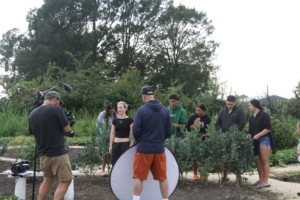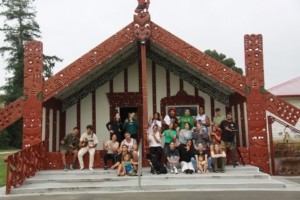
Manaora Rangatahi Guidelines group filming at Aunty’s Garden in Hastings for a 20-week social media campaign.
A 20-week social media campaign, driven by rangatahi Māori aims to spread crucial messages about nutrition and well-being across New Zealand.
The Manaora Rangatahi Guidelines is part of Nourishing Hawke’s Bay: He wairua tō te kai, a collaborative local project between EIT | Te Pūkenga and University of Auckland (UoA).
The guidelines will feature as a 20-week social media campaign, launching on March 4, with influencers Tamati Rimene-Sproat, Pere Wihongi, Georgia Awatea Jones and local rangatahi.
Senior Research Fellow Dr Rachael Glassey, manager of Nourishing Hawke’s Bay, says the core of the project is about empowering youth with holistic health and well-being guidelines.
“It’s a project that the rangatahi have poured their hearts into, offering a fresh take on health that covers everything from eating well and staying active to keeping your mind healthy and staying connected with our culture.”
“These guidelines are about more than just health tips; they’re a blueprint for making real, positive changes in our lives, for everyone across New Zealand.”
Seventeen rangatahi from around Hawke’s Bay have been involved in the project since the middle of last year.
They looked at health guidelines from New Zealand and overseas, and applied mātauranga Māori to them. Then, they sought feedback from their peers at school before refining the messages.
“The current Ministry of Health guidelines don’t really resonate with young people. Our rangatahi participants added key aspects around mātauranga Māori and sustainability. The goal is to bridge these gaps and connect more meaningfully with youth,” Rachael says.
Rangatahi Guideline project lead Raun Makirere-Haerewa says it is important to ensure the messages not only make sense to the rangatahi but that they buy into them.
“I think a big part of the level of engagement and excitement is from the fact that we’re putting the onus on them to create this. It’s not a template. They’ve come up with the work.”
A wānanga was held over three days at Houngarea Marae last month, at which time the campaign content was shot.
Māori media personality, Tamati Rimene-Sproat, says he was happy to be involved with the kaupapa as it aligned with his values.
“It’s rangatahi led and rangatahi driven for rangatahi and that’s really important to me so when Raun reached out and asked if I was interested it made sense to me, and then I had actually done work with Professor Boyd Swinburn in the past, so when his name came up it gave a level of importance and value.”
New Zealand musician, voice actor and kapa haka composer and performer Pere Wihongi (Te Rarawa, Ngā Puhi, Ngāti Kuri, Ngāti Wai) says she was honoured to help contribute.
Flaxmere College student Joseph Curtis says the experience has been “healing”.

Manaora Rangatahi Guidelines group at Houngarea Marae.
“I feel like I have connected more with my Māoritanga here. I feel like I am getting fitter, socialising more and eating healthier. I’m looking after myself, others and having a Māori input on almost everything I do.”
He says he will continue to support the kaupapa.
Ariki-Jaid Moke and Mikaera Rountree, who also attend Flaxmere College, say it has been an “eye-opener”.
“Before we came here, we didn’t really understand how important our health and well-being was. So this has helped us understand the importance of hauora and well-being,” Ariki-Jaid says.
Professor Boyd Swinburn says it has been a journey, and they are interested to see how it unfolds further.
“We’ve got a longer term vision on this, but exactly how are we going to get there is a bit uncertain. We’re just going to follow the kids and let them guide us.”
